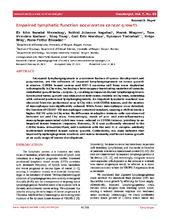| dc.contributor.author | Steinskog, Eli Sihn Samdal | en_US |
| dc.contributor.author | Sagstad, Solfrid Johanne | en_US |
| dc.contributor.author | Wagner, Marek | en_US |
| dc.contributor.author | Karlsen, Tine Veronica | en_US |
| dc.contributor.author | Yang, Ning | en_US |
| dc.contributor.author | Markhus, Carl Erik Nordvik | en_US |
| dc.contributor.author | Yndestad, Synnøve | en_US |
| dc.contributor.author | Wiig, Helge | en_US |
| dc.contributor.author | Eikesdal, Hans Petter | en_US |
| dc.date.accessioned | 2017-04-11T13:23:35Z | |
| dc.date.available | 2017-04-11T13:23:35Z | |
| dc.date.issued | 2016-06-13 | |
| dc.Published | OncoTarget 2016, 7(29):45789-45802 | eng |
| dc.identifier.issn | 1949-2553 | |
| dc.identifier.uri | https://hdl.handle.net/1956/15689 | |
| dc.description.abstract | Increased lymphangiogenesis is a common feature of cancer development and progression, yet the influence of impaired lymphangiogenesis on tumor growth is elusive. C3HBA breast cancer and KHT-1 sarcoma cell lines were implanted orthotopically in Chy mice, harboring a heterozygous inactivating mutation of vascular endothelial growth factor receptor-3, resulting in impaired dermal lymphangiogenesis. Accelerated tumor growth was observed in both cancer models in Chy mice, coinciding with reduced peritumoral lymphangiogenesis. An impaired lymphatic washout was observed from the peritumoral area in Chy mice with C3HBA tumors, and the number of macrophages was significantly reduced. While fewer macrophages were detected, the fraction of CD163+ M2 macrophages remained constant, causing a shift towards a higher M2/M1 ratio in Chy mice. No difference in adaptive immune cells was observed between wt and Chy mice. Interestingly, levels of pro- and anti-inflammatory macrophage-associated cytokines were reduced in C3HBA tumors, pointing to an impaired innate immune response. However, IL-6 was profoundly elevated in the C3HBA tumor interstitial fluid, and treatment with the anti-IL-6 receptor antibody tocilizumab inhibited breast cancer growth. Collectively, our data indicate that impaired lymphangiogenesis weakens anti-tumor immunity and favors tumor growth at an early stage of cancer development. | en_US |
| dc.language.iso | eng | eng |
| dc.publisher | Impact Journals | eng |
| dc.rights | Attribution CC BY | eng |
| dc.rights.uri | http://creativecommons.org/licenses/by/3.0/ | eng |
| dc.subject | Cancer | eng |
| dc.subject | lymphangiogenesis | eng |
| dc.subject | Chy mice | eng |
| dc.subject | tumor associated macrophages | eng |
| dc.subject | IL-6 | eng |
| dc.title | Impaired lymphatic function accelerates cancer growth | en_US |
| dc.type | Peer reviewed | |
| dc.type | Journal article | |
| dc.date.updated | 2016-12-15T13:16:07Z | |
| dc.description.version | publishedVersion | en_US |
| dc.rights.holder | Copyright 2016 The Author(s) | |
| dc.identifier.doi | https://doi.org/10.18632/oncotarget.9953 | |
| dc.identifier.cristin | 1383741 | |

